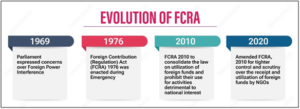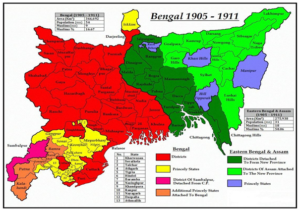Archives
(PRELIMS Focus)
Category: Polity & Governance
Context:
- The Union Ministry of Home Affairs directed NGOs to submit applications for renewal of their Foreign Contribution (Regulation) Act (FCRA) registration at least four months before expiry.
About Foreign Contribution (Regulation) Act (FCRA), 2010:
- Nature: The Foreign Contribution (Regulation) Act (FCRA), 2010, regulates foreign contributions to protect national sovereignty and security. It governs the receipt and use of foreign contributions by individuals, associations, and companies operating in India.
- Objective: The FCRA 2010 aims to ensure that foreign donations do not compromise the nation’s sovereignty or internal security.
- Amendments: Amendments were made in 2020 which brought certain changes.

About Foreign Contribution (Regulation) Amendment Act, 2020:
- Validity & Renewal: FCRA registration is valid for five years, and NGOs are required to apply for renewal within six months of the registration’s expiry.
- Mandates Aadhaar: Office bearers must provide an Aadhaar or passport/OCI card for registration.
- Need for SBI account: Contributions must be received in a designated SBI branch in New Delhi.
- Puts a cap on administrative Use: Administrative expense limits were reduced from 50% to 20%.
- Suspension Extension: Initially, registration suspension can be enforced for a period of 180 days. This suspension can be further extended by an additional 180 days.
- Prohibits certain activities
- The applicant must not represent fictitious entities.
- The applicant should not have been involved in religious conversion activities, either directly or indirectly.
- The applicant must not be engaged in activities related to sedition.
- The FCRA prohibits candidates, journalists, media companies, judges, government servants, politicians, and political organizations from receiving foreign funds.
- FCRA Rules 2022
- In July 2022, the MHA introduced changes to FCRA rules. These changes included increasing the number of compoundable offences from 7 to 12.
- The rules also raised the limit for contributions from relatives abroad that do not require government intimation from Rs 1 lakh to Rs 10 lakh and extended the time limit for intimation of the opening of bank accounts.
Source:
Category: Science & Technology
Context:
- Recently, NASA launched the Interstellar Mapping and Acceleration Probe (IMAP) to map the heliosphere’s boundary, trace energetic particles, and improve space weather forecasting.
About IMAP:
- Nature: The Interstellar Mapping and Acceleration Probe, or IMAP, will explore and map the very boundaries of our heliosphere, a huge bubble created by the Sun’s wind that encapsulates our entire solar system.
- Functioning: The IMAP mission will use 10 scientific instruments to chart a comprehensive picture of what’s roiling in space, from high-energy particles originating at the Sun, to magnetic fields in interplanetary space, to remnants of exploded stars in interstellar space.
- Mass of the spacecraft: It weighs around 900 kilograms (1,984 pounds).
- Launch vehicle: It is launched using Falcon 9, which is a partially reusable, two-stage-to-orbit, medium-lift launch vehicle designed and manufactured by SpaceX.
- Location: The IMAP spacecraft is situated at the first Earth-Sun Lagrange point (L1), at around one million miles from Earth toward the Sun. There, it can provide about a half hour’s warning to voyaging astronauts and spacecraft near Earth of harmful radiation coming their way.
- Investigating heliophysics: The mission will primarily investigate two of the most important overarching issues in heliophysics, viz. how charged particles from the Sun are energized to form what’s known as the solar wind and how that wind interacts with interstellar space at the heliosphere’s boundary.
- Help astronauts: The IMAP mission will additionally support real-time observations of the solar wind, which can flood the near-Earth space environment with dangerous particles and radiation that could harm technology and astronauts in space and disrupt global communications and electrical grids on Earth.
- Expected outcomes of the mission:
- Uncover fundamental physics at scales both tiny and immense.
- Improve forecasting of solar wind disturbances and particle radiation hazards from space.
- Draw a picture of our nearby galactic neighborhood.
- Help determine some of the basic cosmic building materials of the universe.
- Increase understanding of how the heliosphere shields life in the solar system from cosmic rays.

Source:
Category: Government Schemes
Context:
- The Government has extended the Remission of Duties and Taxes on Exported Products (RoDTEP) incentive scheme for exporters until March 31, 2026.
About RoDTEP Scheme:
- Launch: It was launched in 2021 by the Ministry of Commerce and Industry.
- Objective: The RoDTEP scheme is designed to reimburse exporters for embedded duties, taxes, and levies that are not otherwise refunded under any other existing scheme.
- Eligibility: Manufacturer exporters and merchant exporters (traders) are both eligible for the benefits of this scheme. There is no particular turnover threshold to claim the RoDTEP.
- India as country of origin: The exported products need to have the country of origin as India.
- SEZs: The Special Economic Zone Units and Export Oriented Units are also eligible to claim the benefits under this scheme.
- Compliant with WTO norms: The RoDTEP scheme, which replaced the Merchandise Export from India Scheme (MEIS), is fully aligned with World Trade Organization norms.
- Role of CBIC: Rebates under RoDTEP Scheme will be issued as transferable duty credits or electronic scrips (e-scrips), maintained in an electronic ledger by the Central Board of Indirect Taxes and Customs (CBIC).
- Multi-sector scheme: Under RoDTEP, all sectors, including the textiles sector, are covered, so as to ensure uniformity across all areas.
Source:
Category: History & Culture
Context:
- Recently, Undivided Bengal’ emerged as the popular theme of Durga Puja in West Bengal.
About Partition of Bengal:

- Background:
- The Partition of Bengal in 1905 was initiated by Lord Curzon, the then Viceroy of India, citing administrative efficiency due to the vast size and population of Bengal.
- However, the underlying motive was to weaken the growing nationalist movement by dividing Hindus and Muslims. Bengal was split into two provinces: Eastern Bengal and Assam (Muslim-majority) and Western Bengal (Hindu-majority).
- The move was widely opposed by Indian nationalists, who saw it as a strategy of “divide and rule.” The partition sparked widespread protests and gave rise to the Swadeshi Movement, eventually leading to its annulment in 1911.
- Course of the Movement:
- Protests were organised all over Bengal, and the idea of boycotting foreign goods was put into practice.
- A huge gathering was held in Calcutta town hall on August 7, 1905, and a Boycott Resolution was passed. This marked the formal beginning of the Swadeshi movement.
- Krishna Kumar Mitra was the first to suggest the boycott of British goods in Bengal.
- Syed Haidar Raja led the Swadeshi movement in Delhi.
- Role of Moderates:
- Surendranath Banerjee led the Moderate group, which comprised Krishna Kumar Mitra, Jogeshchandra Chaudhuri, Bhupendranath Bose, Prithwishchandra Ray, etc.
- They worked ceaselessly from 1903 to intensify the agitation through press campaigns, meetings, petitions, conferences, etc.
- In their usual style, they forwarded anti-partition arguments in their pamphlets, and a few newspapers, like Sanjibani, Indian Mirror, and Ananda Bazar Patrika, carried their ideas widely.
- Impact of the Movement:
- Public meetings, protests, and the spread of nationalist literature galvanized the masses, especially the youth and middle class.
- The partition also deepened communal divisions, laying early seeds of communal politics.
- However, it unified different sections of Indian society against colonial rule and energized the freedom struggle.
- The British eventually annulled the partition in 1911 due to strong resistance, making it a landmark victory and reinforcing the power of mass mobilization in India’s fight for independence.
Source:
Category: Environment and Ecology
Context:
- Once widespread across the Gulf of Mannar, Palk Bay, the Gulf of Kutch and the Andaman and Nicobar Islands, India’s dugongs dwindled to a few hundred individuals.
About Dugong:
- Nature: Dugongs (Dugong dugon), also called “sea cows,” are marine mammals that graze on seagrass beds, earning them the nickname “farmers of the sea.”
- Behaviour: The dugong is a long-lived species, capable of living up to 70 years. Typically solitary or found in small mother-calf pairs, large herds common in Australian waters are rare in India.
- Uniqueness: Dugongs (Dugong dugon) are the only herbivorous mammals found in India’s marine ecosystems.
- Appearance: It is known as the sea cow, but resembles a cross between a seal and a whale, and is distributed through the Indo-Pacific region.
- Distribution: They are found along the Indian coastline, primarily inhabiting warm waters around the Andaman and Nicobar Islands, the Gulf of Mannar, Palk Bay, and the Gulf of Kutch. The dugong is a long-lived species, able to live up to 70 years.
- Habitat: Due to their dependence on seagrass beds for habitat and food, dugongs are restricted to shallow waters, where they spend the day feeding on seagrasses of the genera Cymodocea, Halophila, Thalassia, and Halodule.
- Reproduction cycle: Individuals reach reproductive maturity after only nine or ten years and can give birth at intervals of around three to five years.
- Conservation status:
- IUCN: Vulnerable
- CITES: Appendix I
- Wildlife Protection Act 1972: Schedule I
- Threats: The threats they face worldwide include rapidly declining populations and the ongoing degradation of their seagrass habitats.
Source:
(MAINS Focus)
Introduction (Context)
India’s future hinges on its 65% young population. With 85% living in districts of birth, yet 60% of GDP concentrated in cities, reclaiming districts as democratic commons is vital to unlock inclusive growth and deepen democratic engagement.
Main Arguments
- Demographic Dividend: In a world with aging populations, India’s 65% youth under 35 is an opportunity, but limited mobility and district neglect risk wasting it.
- Urban Bias: Cities occupy 3% land yet generate 60% GDP, while districts remain under-utilised despite housing the majority. This creates stark geographic and social concentration of growth.
- Centralised Governance: Policy paradigms prioritise efficiency, technocratic schemes, and digital delivery, but weaken local political agency and reduce elected leaders to entitlement mediators.
- Welfare Politics & Fatigue: Rising dependence on cash transfers, without structural transformation or jobs, leads to political fatigue among citizens, especially youth.
- District-First Framework: A shift from “district-first bureaucracy” to “district-first democracy” can disaggregate opaque schemes, localise accountability, track outcomes, and tailor solutions.
Criticisms/Drawbacks
- Bureaucratic Dominance: Citizens interact with the state mainly as recipients, not participants, limiting ownership of development.
- Capacity Deficit: District administrations and panchayats lack funds, skilled manpower, and autonomy to plan holistically.
- Risk of Elite Capture: Local bodies may replicate inequalities without checks on capture by dominant groups.
- Weak Policy Linkages: MPs and local representatives are rarely held accountable for developmental outcomes within constituencies.
- Fragmented Efforts: Civil society, government, and private initiatives often work in silos, reducing district-level synergy.
Reforms/Proposals
- District-First Democratic Commons: Reimagine districts as civic spaces to strengthen participation in production, consumption, and innovation beyond elite and export-driven growth.
- Accountability & Transparency: Disaggregate schemes at district level, track outcomes locally, and bridge disparities in investment and opportunity.
- Strengthening Local Leadership: Empower elected representatives as conveners of developmental priorities rather than mediators of welfare entitlements.
- Shared Responsibility of Elites: Political leaders, corporates, and intellectuals (top 10%) must translate intent into targeted district interventions.
- Collaborative Ecosystem: Link MPs, civil society, private actors to co-create locally tailored reforms and innovations.
Conclusion
India already has a district-first bureaucracy. What it needs now is a district-first democracy. By redistributing power to communities, fostering accountability, and bridging policy–reality gaps, districts can become engines of inclusive growth. Without this shift, India risks hollowing democracy and squandering its demographic dividend.
Mains Question
Discuss the challenges in transforming districts into democratic commons. What institutional reforms are needed to strengthen local political agency? (15 Marks) (250 words, 15 marks)
Introduction (Context)
As the Gaza war enters its second year since Hamas’s October 2023 attacks on Israel, US President Donald Trump has announced a 20-point “Comprehensive Plan to End the Gaza Conflict.” Its provisions have major implications for West Asia and India.
Key Features of the Plan
- Hamas Disarmament: Hamas fighters must surrender weapons; those pledging peaceful coexistence will receive amnesty or safe passage to countries such as Egypt, Qatar, or Jordan.
- International Stabilization Force (ISF): A US–Arab led multinational force will secure Gaza, train Palestinian police, prevent arms smuggling, and facilitate aid. The Israeli Defence Forces (IDF) will withdraw gradually but maintain a limited “security perimeter.”
- Transitional Governance: Gaza will be run by a technocratic, apolitical Palestinian committee, supervised by an international “Board of Peace” chaired by Trump, with figures such as former UK PM Tony Blair included.
- Humanitarian Rehabilitation: Restrictions on aid will be lifted to restore hospitals, electricity, water, bakeries, and infrastructure, with UN and Red Crescent managing distribution.
- Prisoner–Hostage Swap: Israel will release 250 life-sentence prisoners and 1,700 detainees in exchange for the return of 48 hostages held by Hamas.
- Regional Guarantees: Eight Arab and Muslim nations — Qatar, Jordan, UAE, Saudi Arabia, Turkey, Indonesia, Egypt, and Pakistan — have endorsed the plan, while China and Russia have also expressed support.
Criticisms/Concerns
- Feasibility: Disarming Hamas, which has ruled Gaza for nearly two decades, may prove nearly impossible.
- Buffer Zone Clause: Israel’s continued “security perimeter” could amount to de facto occupation.
- Role of Tony Blair: Blair’s Iraq war legacy and commercial links fuel skepticism over impartiality.
- Exclusion of Iran: Leaving Tehran out may aggravate regional fault lines, given its backing of Hamas and Hezbollah.
- Commercial Overtones: Trump and his associates’ business interests in real estate projects risk conflating peace with profit.
Implications for India
- Strategic Relief: Peace could stabilise West Asia, vital since the region supplies about 80% of India’s oil. It would also safeguard India’s large diaspora — 90 lakh in West Asia, including 18,000 in Israel.
- Economic Prospects: Stability may encourage Gulf states to enhance investments in India and accelerate projects like the India–Middle East–Europe Economic Corridor.
- Caution on Pakistan: Pakistan’s visible role — acknowledged and praised by Trump — signals potential revival of US–Pakistan ties, which New Delhi must watch carefully.
- Balancing Diplomacy: India must maintain careful equilibrium between Israel, Arab states, and Iran to avoid strategic entanglements.
- New Avenues: A more stable Gaza could allow India to expand as a development and reconstruction partner beyond hydrocarbons.
Conclusion
The Gaza Peace Plan reflects Trump’s mix of diplomacy and business pragmatism. For India, it offers clear advantages in terms of diaspora security, energy stability, and economic opportunity. Yet, Pakistan’s active role underscores the need for vigilance. New Delhi must engage constructively while safeguarding its strategic autonomy in a volatile region.
Mains Question
“Discuss the implications of the recent US-led Gaza Peace Plan for India’s strategic, economic, and diaspora interests. How should New Delhi navigate opportunities and challenges arising from Pakistan’s involvement in the process?” (250 words, 15 marks)
